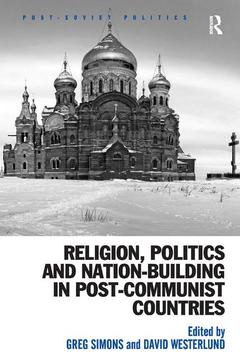Religion, Politics and Nation-Building in Post-Communist Countries Post-Soviet Politics Series
Auteurs : Simons Greg, Westerlund David

Date de parution : 02-2015
15.6x23.4 cm
Thèmes de Religion, Politics and Nation-Building in Post-Communist... :
Mots-clés :
russian; church; moscow; patriarchate; romanian; radio; free; europe; religious; pluralism; Johnson’s Russia List; Ukrainian Autocephalous Orthodox Church; Estonian Apostolic Orthodox Church; Young Men; Caucasus Muslim Board; Ravil Gainutdin; Moscow Patriarchate; Georgian Orthodox Church; Romanian Orthodox Church; Father Rydzyk; Nasz Dziennik; Ukrainian Orthodox Church; Radio Maryja; EELC; Ecumenical Patriarchate; Inter-Orthodox Relations; Weber’s Protestant Ethic; Alexei II; Juma Mosque; Ilia II; Russian Muslims; National Awakening Movement; Estonian National Independence Party; External Church Relations; Estonian Heritage Society



